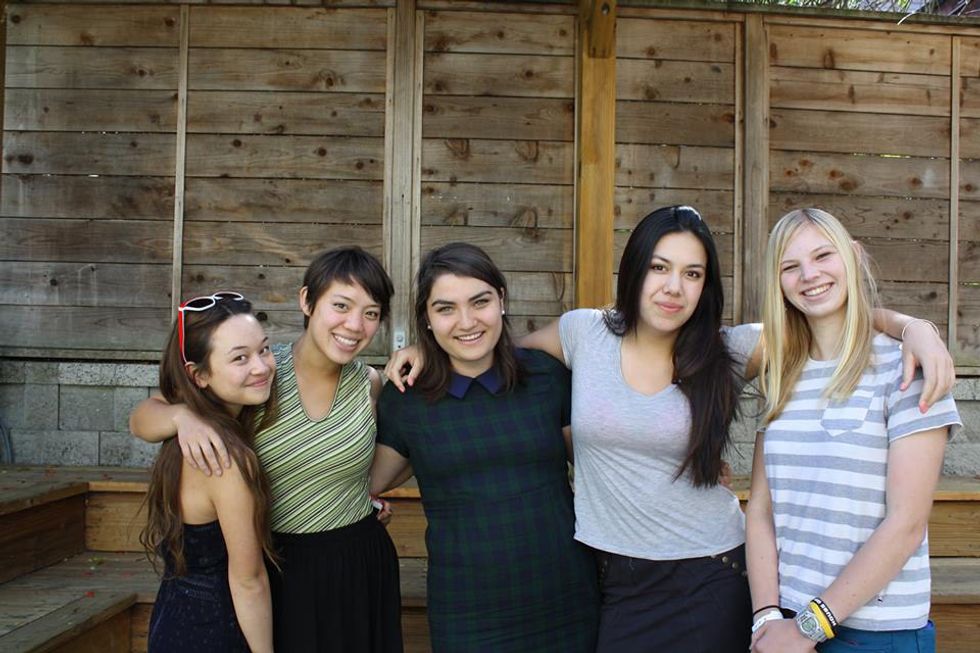2012 – You have one new notification: Sarah Small has friended you on Facebook.
2013 – You have one new notification: Lil Smallz has friended you on Facebook.
2014 – You have one new notification: Sarah Chen Small has friended you on Facebook.
Somewhere between beginning high school and moving across the country to college (with a brief intermission of the customarily embarrassing name change during application season), I changed my Facebook to reflect my full legal name. Soon my exams, my school ID, and my articles also read Sarah Chen Small.
“I’m sorry, is it Sarah Small or Sarah Chen Small? What’s your last name – do you have two?”
I can trace each piece of my name back to my mother and father beginning a family in San Francisco; to ships pulling into unfamiliar harbors and hungry train rides; to tearful goodbyes and dreams of a new life. For most of my life, I went by the nondescript Sarah Small – formulaic and easy. The alliteration and neutrality oddly smooth compared to the prodding questions my appearance sometimes generates and the complicated history of my family.
I was born Sarah Chen Small – my older sister is Rebecca Chen Small. We were given our first names for our Russian Jewish great-grandmothers we never knew. Our middle names are both Chen, our mother’s surname. Small is an Ellis Island bastardization of Smalokov.
The timing of my name change is not accidental: it coincided with the growth of my friendships with other mixed girls, my acceptance into my dream university, and the solidification of my interest in ethnic studies and social justice.
Kyla, Mackenzie, Celeste, myself, Nora (2014)
In high school I was blessed with a Hapa girl clique (plus Nora). Kyla, Mackenzie, and Celeste (honorable mention to Marina, not pictured) ate countless Asian-fusion lunches with me, spent hours discussing the overlaps and diversions of our families’ stories, and the pressures and privileges unique to being mixed-ambiguous. Nora is to date one of the most supportive white friends I’ve had – the distinction of white mattering as she stuck through many conversations she couldn’t directly relate to. I wouldn’t have made it without these girls. Together we began thinking about issues that are only just coming to the forefront of mainstream American consciousness as the multi-racial (and therefore category-less) population rises to a critical mass.
Around the same time, I got into Wesleyan University and was informally assured a spot on the volleyball team. In a beautiful piece on the value of ethnic studies, poet-activist Isabella Borgeson said, “We carry our ancestors on our graduation robes.”
I cried on the floor of my private high school’s art room when I got in. Some of this was shock and relief. I think most of it was a moment of deep gratitude for my grandparents and great-grandparents who came to a country where they had nothing and no one. For my Popo and Dede for sacrificing tirelessly for their children. My Popo was born in rural China, given no access to education, and married with a baby by age 17. I am endlessly impressed with her strength. Thirty-six years after the birth of her first child, her youngest–my mother–graduated from Harvard Law School.
Sarah Chen Small got into Wesleyan because the Chen family, along with the Small family, gave me every opportunity they could. How could I write my mother, aunts and uncles, and grandparents out of myself when I would have nothing without them?
I have also become increasingly involved in student activism. I am trying to navigate my white/wealth/cis-hetero privilege more responsibly while not neglecting my person of color, Chinese American, and Hapa self.
As much as I try to sort out this question of naming, certain thoughts reappear when filling out Name (First & Last):
If I say Sarah Small am I only giving credit to my white family? Stupid patriarchy, why do we take our fathers’ or husbands’ names anyway? Sarah Small is shorter though – my hand hurts. Sarah Chen Small does the work for me; it gives people a taste of my identity so I don’t have to field as many prying questions. Is that lazy? Am I ignoring my white privilege by inducing an ethnic-sounding name? My mother's family doesn't have the privilege of being born with white-sounding names. Do I just want more cred as a POC? Is that wrong? Hmm, which one today? Eeny-meeny-miny-moe…
It feels like I over-inherited; maybe there were so many different histories to fit into one person that they named me a few times. That's what being Hapa means to me, fitting puzzle pieces of doubt, structural inequality, heritage, pride, and love together. I think I’ll keep all my names.





 Photo by
Photo by  Photo by
Photo by  a group of people sitting around a table with laptopsPhoto by
a group of people sitting around a table with laptopsPhoto by  people on beach during daytimePhoto by
people on beach during daytimePhoto by  Photo by
Photo by 












